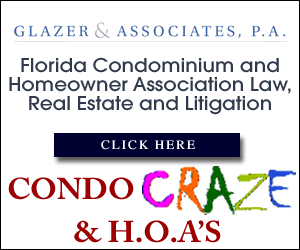|
ASSOCIATIONS
AND NEW MANAGERS BETTER BE CAREFUL WITH COLLECTIONS
By
Eric Glazer, Esq.
Published
October 21, 2013
A decision of the 4th District Court of Appeals in Yang v. Sebastian Lakes Condominium Association, Inc. was recently handed down, and associations and managers need to take note. In sum, a condominium association in Vero Beach called Sebastian Lakes foreclosed on 2 unit owners due to alleged unpaid assessments. At the trial, the new management company representative testified and introduced the actual account ledgers as evidence. The owner's attorney objected to this --- and said that these records are "hearsay" because the person testifying has no idea as to the accuracy of the past balances from the prior accountant.
This did not bother the trial judge however who allowed the ledgers into evidence and ruled in favor of the association and entered a final judgment for foreclosure of the two homes.
Let's have a two second law school class: The question is whether or not these account ledgers with past due balances that were put into evidence is hearsay. Hearsay is simply an out of court statement coming in to prove the truth of the matter asserted. For example, these ledgers were prepared outside of court and are being introduced to prove that the owners owe money. That means it's hearsay. Hearsay is inadmissible unless it comes in under what's known as a "hearsay exception." One "hearsay exception" is called the "business record exception." The association argued that these account ledgers are "business records" and therefore even though they are hearsay documents --- they still come into evidence as an exception to the hearsay rule.
In order to secure admissibility under the "business records" exception, the proponent must show that (1) the record was made at or near the time of the event; (2) was made by or from information transmitted by a person with knowledge; (3) was kept in the ordinary course of a regularly conducted business activity; and (4) that it was a regular practice of that business to make such a record. If the condo association, through its manager, is able to do all that -- these ledgers can come in as evidence.
The association called the records custodian of the new management company as a witness -- and the witness used all of the right buzz words in order that these ledgers come into evidence. However, the witness testified that the records prior to the 2008 takeover by the new management company were maintained by the prior accountant, that she started with an account balance from outside records, that she did not know the prior accountant's practice and procedure, and that she never worked for that accountant. She was unable to testify as to the accuracy of the starting balances. As a result……….the appeals court said these records were inadmissible hearsay. The appellate court reversed the findings of the lower court, vacated the foreclosure judgments and sent the case back to the trial court with instructions to enter judgment in favor of the defendant homeowners.
To make matters worse for the association……….they will now have to pay all of the attorney's fees and costs incurred by these homeowners, including appellate attorney's fees…..and this is going to be a huge judgment in the owner's favor.
We see this a lot. Some management companies have poor record keeping. They eventually get fired and a new management company takes over. The old management company simply tells the new management company what the owners owe on each unit, but they don't provide sufficient backup records. So….. the new management company starts up their book keeping system and immediately puts in a past due balance, but it doesn't say for what specific months this money is owed. There is simply no breakdown whatsoever, just a starting balance.
Bottom line, if your new management company says there's a balance due --- according to the old management company --- and there's no backup ----- that money is uncollectable should a unit owner fight the association about it in court. If the association loses, it's going to cost them a lot of money. In addition, if an association needs to actually have a foreclosure trial, the person from the management company who is going to testify better be able to say based upon personal knowledge that they know the charges each month, and that the ledgers are correct.
|
|
About
HOA & Condo Blog
|

|
Eric Glazer graduated from the University of
Miami School of Law in 1992 after receiving a B.A. from
NYU. He is currently entering his 20th year as a
Florida
lawyer practicing |
community association law and is the owner of
Glazer and Associates, P.A. an eight attorney law firm in
Orlando
and
Hollywood
For the past two years Eric has been the host of Condo Craze and
HOAs, a weekly one hour radio show on 850 WFTL.
See: www.condocrazeandhoas.com.
He is the first attorney in the State of Florida
that designed a course that certifies condominium residents as
eligible to serve on a condominium Board of Directors and has
now certified more than 2,500 Floridians. He is certified as a
Circuit Court Mediator by The Florida Supreme Court and has
mediated dozens of disputes between associations and unit
owners. Finally, he recently argued the Cohn v. Grand
Condominium case before The Florida Supreme Court, which is
perhaps the single most important association law case decided
by the court in a decade. |
|

|
|
|
|
|
|


